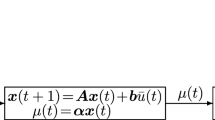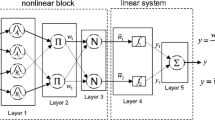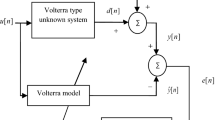Abstract
Multivariable Hammerstein time-delay (MHTD) systems have been widely used in a variety of complex industrial systems; thus, it is of great significance to identify the parameters of such systems. The MHTD system is difficult to identify due to its inherent complexity. As one of heuristic algorithms, the gravitational search algorithm is suitable for identifying such complex models, but it has the problem of easily falling into local optimum. Therefore, this paper combines the improved chaotic gravitational search algorithm (ICGSA) and gradient iterative (GI) algorithm and proposes an ICGSA–GI algorithm to overcome the shortcomings of the above two algorithms. Then, we use it to identify the unknown parameters of the MHTD systems. Finally, a numerical example and an application case are given for validating the feasibility of the three identification methods. The results demonstrate that the three algorithms can identify the unknown parameters of the MHTD system effectively. In addition, by comparing with ICGSA and GI algorithms, this paper confirms that the ICGSA–GI algorithm behaves better than ICGSA and GI algorithm in identification accuracy, and the convergence speed of the ICGSA–GI algorithm is faster than that of the GI algorithm.








Similar content being viewed by others
Data Availability
All data generated or analyzed during this study are included in this article.
References
B.M. Al-Hadithi, A. Jiménez, J.P. Oria, New incremental Takagi-Sugeno state model for optimal control of multivariable nonlinear time delay systems. Eng. Appl. Artif. Intell. 45, 259–268 (2015)
S.M. Boopalan, S. Alagala, A new affine projection algorithm with adaptive \(l_0\)-norm constraint for block-sparse system identification. Circuits Syst. Signal Process. (2022). https://doi.org/10.1007/s00034-022-02197-y
Y. Cao, Y.R. Yang, L.C. Ma, J.K. Wen, Research on virtual coupled train control method based on GPC & VAPF. Chin. J. Electron. 31(5), 897–905 (2022)
G. Chekib, R. Zeineb, B.B. Naceur, Robust stabilization and tracking control schemes for disturbed multi-input multi-output Hammerstein model in presence of approximate polynomial nonlinearities. Proc. Inst. Mech. Eng. I J. Syst. Control Eng. 235(7), 1245–1257 (2021)
J. Chen, B. Huang, M. Gan, C.L.P. Chen, A novel reduced-order algorithm for rational models based on Arnoldi process and Krylov subspace. Automatica 129, 109663 (2021)
Y.F. Chen, C. Zhang, C.Y. Liu, Y.M. Wang, X.K. Wan, Atrial fibrillation detection using a feedforward neural network. J. Med. Biol. Eng. 42(1), 63–73 (2022)
J. Chen, Q.M. Zhu, Multi-step-length gradient iterative algorithm for equation-error type models. Syst. Control Lett. 115, 15–21 (2018)
J. Chen, Q.M. Zhu, Y.J. Liu, Modified Kalman filtering based multi-step-length gradient iterative algorithm for ARX models with random missing outputs. Automatica 118, 109034 (2020)
F. Ding, Least squares and multi-innovation least squares methods. J. Comput. Appl. Math. 426, 115107 (2023)
F. Ding, T.W. Chen, Combined parameter and output estimation of dual-rate systems using an auxiliary model. Automatica 40(10), 1739–1748 (2004)
F. Ding, T.W. Chen, Parameter estimation of dual-rate stochastic systems by using an output error method. IEEE Trans. Autom. Control 50(9), 1436–1441 (2005)
J. Ding, F. Ding, X.P. Liu, G. Liu, Hierarchical least squares identification for linear SISO systems with dual-rate sampled-data. IEEE Trans. Autom. Control 56(11), 2677–2683 (2011)
F. Ding, X.M. Liu, H.B. Chen, G.Y. Yao, Hierarchical gradient based and hierarchical least squares based iterative parameter identification for CARARMA systems. Signal Process. 97, 31–39 (2014)
F. Ding, H. Ma, J. Pan, E.F. Yang, Hierarchical gradient- and least squares-based iterative algorithms for input nonlinear output-error systems using the key term separation. J. Frankl. Inst. 358(9), 5113–5135 (2021)
F. Ding, L. Xu, X. Zhang, Filtered auxiliary model recursive generalized extended parameter estimation methods for Box–Jenkins systems. Int. J. Robust Nonlinear Control (2023). https://doi.org/10.1002/rnc.6657
F.Z. Geng, X.Y. Wu, A novel kernel functions algorithm for solving impulsive boundary value problems. Appl. Math. Lett. 134, 108318 (2022)
F.Z. Geng, X.Y. Wu, Reproducing kernel-based piecewise methods for efficiently solving oscillatory systems of second-order initial value problems. Calcolo 60(2), 20 (2023)
Y. Ji, A.N. Jiang, Filtering-based accelerated estimation approach for generalized time-varying systems with disturbances and colored noises. IEEE Trans. Circuits Syst. II Express Briefs 70(1), 206–210 (2023)
Y. Ji, Z. Kang, Three-stage forgetting factor stochastic gradient parameter estimation methods for a class of nonlinear systems. Int. J. Robust Nonlinear Control 31(3), 971–987 (2021)
Y. Ji, Z. Kang, X.M. Liu, The data filtering based multiple-stage Levenberg-Marquardt algorithm for Hammerstein nonlinear systems. Int. J. Robust Nonlinear Control 31(15), 7007–7025 (2021)
Y. Ji, C. Zhang, Z. Kang, T. Yu, Parameter estimation for block-oriented nonlinear systems using the key term separation. Int. J. Robust Nonlinear Control 30(9), 3727–3752 (2020)
A.N. Jiang, Y. Ji, L.J. Wan, Iterative parameter identification algorithms for the generalized time-varying system with a measurable disturbance vector. Int. J. Robust Nonlinear Control 32(6), 3527–3548 (2022)
Z. Kang, Y. Ji, X.M. Liu, Hierarchical recursive least squares algorithms for Hammerstein nonlinear autoregressive output-error systems. Int. J. Adapt. Control Signal Process. 35(11), 2276–2295 (2021)
J.M. Li, A novel nonlinear optimization method for fitting a noisy Gaussian activation function. Int. J. Adapt. Control Signal Process. 36(3), 690–707 (2022)
M.H. Li, X.M. Liu, The filtering-based maximum likelihood iterative estimation algorithms for a special class of nonlinear systems with autoregressive moving average noise using the hierarchical identification principle. Int. J. Adapt. Control Signal Process. 33(7), 1189–1211 (2019)
M.H. Li, X.M. Liu, Iterative identification methods for a class of bilinear systems by using the particle filtering technique. Int. J. Adapt. Control Signal Process. 35(10), 2056–2074 (2021)
M.H. Li, X.M. Liu, Maximum likelihood hierarchical least squares-based iterative identification for dual-rate stochastic systems. Int. J. Adapt. Control Signal Process. 35(2), 240–261 (2021)
X.Y. Li, B.Y. Wu, A kernel regression approach for identification of first order differential equations based on functional data. Appl. Math. Lett. 127, 107832 (2022)
J.H. Li, J.L. Zhang, Maximum likelihood identification of dual-rate Hammerstein output-error moving average system. IET Control Theory Appl. 14(8), 1089–1101 (2020)
J.H. Li, T.C. Zong, G.P. Lu, Parameter identification of Hammerstein–Wiener nonlinear systems with unknown time delay based on the linear variable weight particle swarm optimization. ISA Trans. 120, 89–98 (2022)
H. Ma, J. Pan, W. Ding, Partially-coupled least squares based iterative parameter estimation for multi-variable output-error-like autoregressive moving average systems. IET Control Theory Appl. 13(18), 3040–3051 (2019)
J.X. Ma, W.L. Xiong, J. Chen, Hierarchical identification for multivariate Hammerstein systems by using the modified Kalman filter. IET Control Theory Appl. 11(6), 857–869 (2017)
H.R. Marzban, Parameter identification of a class of nonlinear multidelay systems with piecewise constant delays. Asian J. Control 24(1), 367–376 (2022)
S. Mete, S. Ozer, H. Zorul, System identification using Hammerstein model optimized with differential evolution algorithm. AEU Int. J. Electron. Commun. 70(12), 1667–1675 (2016)
H. Mittal, R. Pal, A. Kulhari, Chaotic Kbest gravitational search algorithm (CKGSA), in Ninth International Conference on Contemporary Computing, pp. 1–6 (2016)
J. Pan, X. Jiang, X.K. Wan, W.F. Ding, A filtering based multi-innovation extended stochastic gradient algorithm for multivariable control systems. Int. J. Control Autom. Syst. 15(3), 1189–1197 (2017)
J. Pan, S.D. Liu, J. Shu, X.K. Wang, Hierarchical recursive least squares estimation algorithm for secondorder Volterra nonlinear systems. Int. J. Control Autom. Syst. 20(12), 3940–3950 (2022)
J. Pan, H. Ma, X. Zhang, Q.Y. Liu, F. Ding, Y.F. Chang, J. Sheng, Recursive coupled projection algorithms for multivariable output-error-like systems with coloured noises. IET Signal Process. 14(7), 455–466 (2020)
S. Selvanathan, A.K. Tangirala, Time-delay estimation in multivariate systems using Hilbert transform relation and partial coherence functions. Chem. Eng. Sci. 65(2), 660–674 (2010)
Z.W. Shi, H.D. Yang, M. Dai, The data-filtering based bias compensation recursive least squares identification for multi-input single-output systems with colored noises. J. Frankl. Inst. 360(7), 4753–4783 (2023)
J.L. Sun, X.G. Liu, A novel APSO-aided maximum likelihood identification method for Hammerstein systems. Nonlinear Dyn. 73(1–2), 449–462 (2013)
L.J. Wan, Decomposition and gradient-based iterative identification algorithms for multivariable systems using the multi-innovation theory. Circuits Syst. Signal Process. 38(7), 2971–2991 (2019)
D.Q. Wang, Parameter estimation algorithms for multivariable Hammerstein CARMA systems. Inf. Sci. 355–356, 237–248 (2016)
D.Q. Wang, Q.H. Fan, Y. Ma, An interactive maximum likelihood estimation method for multivariable Hammerstein systems. J. Frankl. Inst. 357(17), 12986–13005 (2020)
H. Wang, H. Fan, J. Pan, A true three-scroll chaotic attractor coined. Discrete Contin. Dyn. Syst. Ser. B 27(5), 2891–2915 (2022)
H.J. Wang, G.Y. Ke, G.L. Dong, Q.F. Su, J. Pan, Singularly degenerate heteroclinic cycles with nearby apple-shape attractors. Int. J. Bifurc. Chaos 33(1), 2350011 (2023)
Y.J. Wang, M.H. Wu, Recursive parameter estimation algorithm for multivariate output-error systems. J. Frankl. Inst. 355(12), 5163–5181 (2018)
L. Xu, Separable multi-innovation Newton iterative modeling algorithm for multi-frequency signals based on the sliding measurement window. Circuits Syst. Signal Process. 41(2), 805–830 (2022)
L. Xu, Separable Newton recursive estimation method through system responses based on dynamically discrete measurements with increasing data length. Int. J. Control Autom. Syst. 20(2), 432–443 (2022)
L. Xu, F.Y. Chen, T. Hayat, Hierarchical recursive signal modeling for multi-frequency signals based on discrete measured data. Int. J. Adapt. Control Signal Process. 35(5), 676–693 (2021)
L. Xu, F. Ding, E.R. Yang, Auxiliary model multiinnovation stochastic gradient parameter estimation methods for nonlinear sandwich systems. Int. J. Robust Nonlinear Control 31(1), 148–165 (2021)
L. Xu, G.L. Song, A recursive parameter estimation algorithm for modeling signals with multi-frequencies. Circuits Syst. Signal Process. 39(8), 4198–4224 (2020)
J.Y. You, Y.J. Liu, J. Chen, Iterative identification for multiple-input systems with time-delays based on greedy pursuit and auxiliary model. J. Frankl. Inst. 356(11), 5819–5833 (2019)
X. Zhang, Hierarchical parameter and state estimation for bilinear systems. Int. J. Syst. Sci. 51(2), 275–290 (2020)
X. Zhang, State estimation for bilinear systems through minimizing the covariance matrix of the state estimation errors. Int. J. Adapt. Control Signal Process. 33(7), 1157–1173 (2019)
X. Zhang, Recursive identification of bilinear time-delay systems through the redundant rule. J. Frankl. Inst. 357(1), 726–747 (2020)
T.C. Zong, J.H. Li, G.P. Lu, Auxiliary model-based multi-innovation PSO identification for Wiener–Hammerstein systems with scarce measurements. Eng. Appl. Artif. Intell. 106, 104470 (2021)
Acknowledgements
This work was supported in part by the National Natural Science Foundation of China (61973176, 61973178, U2066203) and the Qinglan Project of Jiangsu Province of China.
Author information
Authors and Affiliations
Corresponding author
Additional information
Publisher's Note
Springer Nature remains neutral with regard to jurisdictional claims in published maps and institutional affiliations.
Rights and permissions
Springer Nature or its licensor (e.g. a society or other partner) holds exclusive rights to this article under a publishing agreement with the author(s) or other rightsholder(s); author self-archiving of the accepted manuscript version of this article is solely governed by the terms of such publishing agreement and applicable law.
About this article
Cite this article
Li, J., Song, W., Jiang, Y. et al. Improved Gravitational Search and Gradient Iterative Identification for Multivariable Hammerstein Time-Delay Systems. Circuits Syst Signal Process 42, 5161–5186 (2023). https://doi.org/10.1007/s00034-023-02361-y
Received:
Revised:
Accepted:
Published:
Issue Date:
DOI: https://doi.org/10.1007/s00034-023-02361-y




